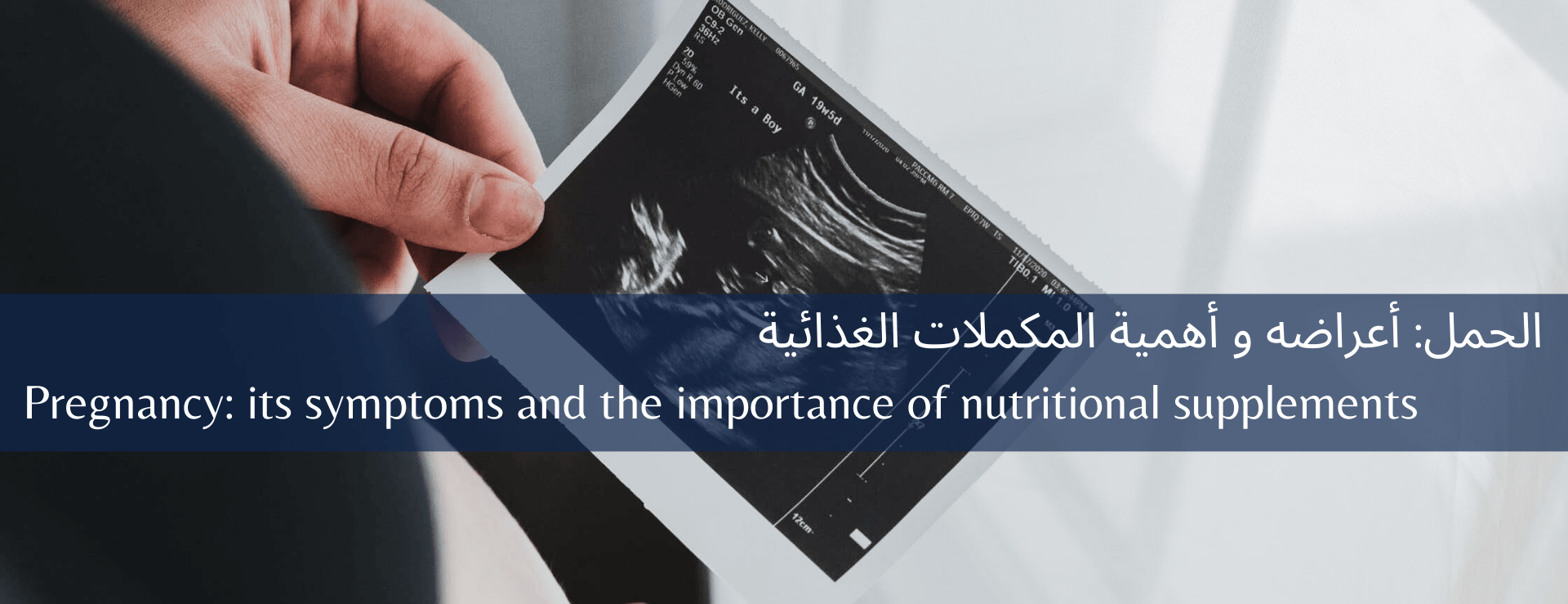What is pregnancy and what are its symptoms?
Pregnancy occurs when the male sperm fertilizes the female egg following its exit from the ovary into the uterus, and fertilization occurs through the fusion of the sperm and the egg together, then this fertilized egg moves to the lower part of the uterus where implantation occurs.
It takes about 40 weeks of pregnancy for the baby to grow inside the abdomen. That is approximately nine months. Doctors can tell when a baby will be due by looking at the date of a woman’s last menstrual period. Taking good care of the mother and going to the doctor for tests helps ensure the health of the baby when he is born.
The pregnancy symptoms that a woman feels during pregnancy vary from one woman to another. Some women may feel these symptoms before their period usually begins. The symptoms are similar to what women feel before menstruation begins. As for when pregnancy symptoms begin, some women may exhibit pregnancy symptoms during the first weeks of fertilization of the egg, and some women may exhibit pregnancy symptoms before their menstrual cycle.
Early pregnancy symptoms
There are many early signs of pregnancy. Among the most prominent of these signs we find:
- Absence of the menstrual cycle: It must be taken into account that there are other pathological or physiological reasons other than pregnancy that lead to the cessation of the menstrual cycle.
- Pain when touching the breasts: due to rapid hormonal changes in your body.
- Mood swings: Starting from the sixth week, the pregnant woman begins to feel mixed feelings of depression, excitement, anxiety, and joy due to hormonal disturbances.
- Nausea or vomiting: Some women may experience nausea and vomiting a few weeks after implantation, although this is not the case for everyone.
Importance of supplementation during pregnancy
Pregnancy can be nutritionally challenging, requiring increased demands for energy, protein, vitamins and minerals. The maternal diet must provide adequate amounts of nutrients both for the developing foetus and to maintain its metabolism until the ninth month of pregnancy. The demand for nutrients is highest during preconception, pregnancy, postpartum and lactation, so a balanced diet can be supplemented with food supplements to balance the incremental energy requirement.
There are certain nutrients, vitamins and natural ingredients that are beneficial during these stages. It is always advisable to consult a medical professional, gynaecologist or midwife before taking any supplements.
Essential vitamins and minerals during pregnancy
Scientific evidence has shown that micronutrients that promote normal embryonic and foetal development include folic acid (vitamin B9), iron, iodine, calcium, vitamin B12, vitamin D and omega-3 fatty acids.
The benefits they provide and why they are among the most recommended, according to the Clinical Practice Guide on Care in Pregnancy and the Postpartum Period of the Ministry of Health, Social Services and Equality and the European Food Safety Authority (EFSA), are detailed below.
Folic acid during pregnancy (Vitamin B9)
Folates are essential nutrients, which cannot be synthesised by the body, and must therefore be incorporated through the diet. The relationship between folic acid deficiency during foetal development and the increased risk of neural tube defects (NTD), one of the most common congenital anomalies that occurs between days 21 and 27 of embryonic life and the most commonly known is spina bifida, is well known. EFSA has defined a daily supplementary intake of folic acid during pregnancy of 400-600 µg for at least one month before and up to three months after conception.
Vitamin D for maternal bone health
Vitamin D or calciferol contributes to the normal maintenance of bone and muscle function. During pregnancy, an adequate supply of this vitamin is essential to maintain maternal health and proper foetal skeletal growth. Deficiency is associated with intrauterine growth retardation (IUGR), rickets, and changes in tooth enamel, among others.
A recent study of more than 300 pregnant women from 14 weeks to the end of pregnancy demonstrated the positive effect of oral vitamin D supplementation on maternal bone health by reducing the increase in the bone resorption marker.
According to EFSA, the vitamin D requirement for pregnant women is 15 µg/day (600 IU). During the preconception period the recommendation is 5 micrograms per day.
Vitamin B12 in pregnancy
Vitamin B12 plays an important role in folate absorption during pregnancy and is involved in erythropoiesis (production of red blood cells in the body). Deficiency is associated with an increased risk of spina bifida, impaired cognitive function and megaloblastic anaemia. The daily requirement of this vitamin increases during the gestational period. With EFSA recommending a daily intake in pregnancy and lactation of 4.5 µg/day and 5 µg/day, respectively.
Iodine supplementation during pregnancy
Iodine is an essential nutrient that contributes to normal cognitive and nervous system function and to the normal production of thyroid hormones, which are necessary for proper brain and mental development throughout foetal and neonatal life.
According to the WHO (World Health Organisation), iodine deficiency is the leading cause of preventable brain damage worldwide.
Through the mother, the foetus receives maternal thyroid hormones, and its supply is particularly sensitive during weeks 10-12 of pregnancy. Deficiencies can have an irreversible impact on the child’s neurological development in the first half of pregnancy.
Iron supplementation for women
Throughout pregnancy, most women will experience haematological changes, with iron deficiency anaemia (iron deficiency anaemia) being the most common nutritional deficiency in pregnant women (40%).
Iron deficiency during pregnancy has been linked to prematurity and reduced physical and neurological development of newborns. As iron contributes to the normal cognitive development of children. In the second and third trimester of pregnancy, a negative iron balance is common, so in addition to an iron-rich diet, extra iron supplementation is very positive.
Thus, during the second half of pregnancy in women without a history of iron deficiency and with adequate iron reserves, oral supplementation with low doses of iron, specifically 7-16 mg/day, is recommended. According to EFSA, such supplementation can also be prolonged during the lactation period.
Omega 3 in pregnancy
Omega 3 fatty acids play an energetic and metabolic reserve role in the body. Studies have shown that both the foetus and newborns demand amounts of Omega 3 that exceed the intake of most pregnant and lactating women, highlighting a potential shortage for both mother and baby. This demonstrates the importance of improving maternal omega-3 status during pregnancy and lactation, which can be done through omega-3 supplementation.
Following evaluation of the benefit of omega-3 intake during pregnancy, nutrition experts, obstetricians and neonatologists concluded at the “European Consensus Conference on the Recommendation of Polyunsaturated Fatty Acids for Pregnant and Lactating Mothers” that the daily intake of omega-3 polyunsaturated fatty acids should be increased by 200 mg DHA/day during pregnancy and lactation. Thus, and in accordance with EFSA, the following recommendations are established for pregnant or conceiving and breastfeeding women.
- 250 mg/day DHA and EPA + 100-200 mg/day DHA (Omega-3).
- 0.5% Alpha-linolenic acid (Omega 3) of total energy intake.
- 4% linoleic acid (Omega 6) of total energy intake.
Calcium in pregnancy
Calcium is the most abundant mineral in humans, because it is found as part of our bone structure and contributes to normal muscle function and neurotransmission. The adaptive physiological changes that occur during pregnancy (e.g. increased efficiency of absorption to facilitate delivery from the mother to the foetus) are largely independent of maternal calcium intake.
Consequently, the EFSA expert panel concludes that no additional calcium supplementation is required in pregnant and lactating women, as the recommended daily intake (750 – 860 mg/day) is covered through the diet with 2-3 servings of calcium-rich foods such as cheese, milk and non-dairy sources. In case of calcium supplementation during pregnancy, a physician should be consulted.
- Aecosan – Efsa evalúa la seguridad de los ácidos grasos omega 3 de cadena larga
- Buil Arasanz, M. E. et al. Vitamina B 12 y dieta vegetariana. Volume 35, Issue 8, October 2009, Pages 412-414.
- Complementos Alimenticios – AFEPADI – Deficiencia de yodo durante el embarazo: mayor conocimiento y prevención
- Conselleria de Sanidad Valenciana. Taller Suplementación yodo y fólico en embarazo y lactancia
- EFSA – Valores de referencia dietéticos (DRV)
- Hurtado Sánchez, M. F. et al. Consumo rutinario de vitaminas y minerales durante la gestación. Rev. Latin. Perinat. 2019, 22 (3) :(192).
- López Rodríguez, M.J. et al. Suplementos en embarazadas: controversias, evidencias y recomendaciones. Inf Ter Sist Nac Salud 2010; 34: 117-128.
- Maldonado Araque, M.C. Prevalencia de disfunción tiroidea en la población española. Tesis doctoral. Facultad de medicina. Departamento de Farmacología y Pediatría.
- Martínez García, R. M. et al. Suplementos en gestación: últimas recomendaciones. Nutr. Hosp. vol.33 supl.4 Madrid 2016.
- Ministerio de Sanidad, Servicios Sociales e Igualdad – Guía de práctica clínica de atención en el embarazo y puerperio




